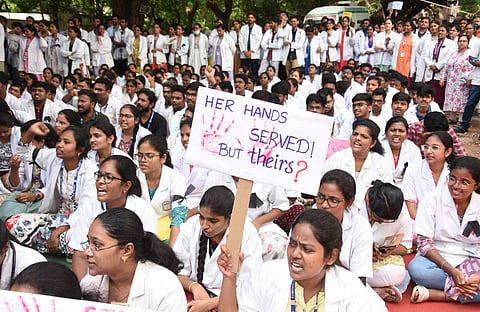

NEW DELHI: The Union Health Ministry in its letter on Tuesday stated that security of the female health professionals who are on duty will get enhanced security in all central government hospitals and institutions, including AIIMS. They will also be provided with appropriately secured transport for their commute at night.
Apart from this, more than one woman health professional will be deployed at night, and adequate lighting will be provided in the hospital premises, especially at the duty areas used by female healthcare staff, the order reads.
This order came in the wake of the brutal rape and murder of a 31-year-old woman trainee doctor in a state-run hospital in Kolkata on August 9.
The ministry in a letter to the central government hospitals on August 19, said that well-secured duty rooms with basic amenities should be provided for female health professionals, the hospitals should install CCTV cameras, employ an adequate number of well-trained security guards, strictly monitor entry and exit of staff, patients, and visitors; and also train all hospital employees, including doctors, nurses and administrative personnel in recognising and responding to security threats.
Among the 12 directives issued, the ministry also asked the hospitals to map dark spots on campus and ensure adequate lighting on the premises, particularly in the duty areas of the lady health care staff, parking lots, entryways, etc.
Given these challenges in ensuring security in government hospitals, the letter listed appropriate action to be taken by the heads to address the security issues in their institutes.
Institutes must have a comprehensive plan to tackle various types of emergencies
The ministry also stated that the heads of these institutes must draw a comprehensive plan for tackling various types of emergencies. These plans should be regularly updated and rehearsed, including periodic mock drills to train staff and security personnel for effective emergency responses.
The letter also said that hospital authority should ensure a coordinated response in case of incidents in close coordination with local police and emergency services. Security policies should be updated based on feedback and incident analysis.
It also said that hospitals should have an adequate number of patient facilitators and patient coordinators to assist patients, provide information, and guide patients in hospitals and institutes.